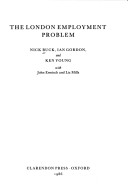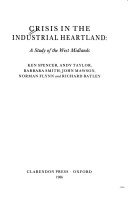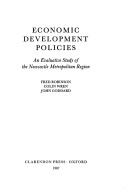ESRC Inner Cities Research Programme S.
3 primary works
Book 5
This is a study of economic change, jobs, and public policy in London. It focuses particularly on two groups of boroughs - Brent, Ealing and Hounslow in outer west London; and Southwark, Lewisham, and Greenwich in inner south-east Lonon - but relates their experience to broader patterns of change in the whole metropolitan region. Since the early 1960s London has experienced a massive decline in both populaton and employment which has been seen as weakening the economic base of the city. The authors examine the process of decentralization, job loss, and labour market adjustment which have shaped the London employment problem, and the attempts of the London authorities to promote economic development. They challenge the view that decentralization has seriously weakened the London economy. They argue, rather , that the central problems are inequality in the housing and labour markets, exacerbated by national recession and a fragmented local government system.
Book 6
This is one of five local studies carried out under the Economic and Social Research Council's Inner City in Context research programme and offers a specific example of an economy in sudden decline to set against the experience of Glasgow, Newcastle, London, and Bristol. The volume traces the economic decline of the West Midlands from its days as a highly prosperous growth area based on manufacturing, to one with a contracting industrial base. It analyses the impact of the current recession on this major industrial complex and shows how the seeds of decline were present throughout the late 1960s and 1970s. After rapid growth in the 1960s, the industrial base of Birmingham shrank by a third in the 1970s, and 26 of the largest companies cut their workforce by 40 per cent as the key sectors of manufacturing, engineering and cars declined. By 1984 regional unemployment was 17 per cent, but in ten Birmingham wards it was over 30 per cent, and in three over 40 per cent. The authors first trace the evolution of the economy in the social context of such things as demographic patterns, housing characteristics, and other environmental conditions.
They then analyse the changes which have taken place in the economy of the region and offer a range of explanations for these. Finally they consider the policy responses made by large firms and by central and local government, and assess the relevance of these policies for the local economy. Graduate and first-degree students taking courses in urban and regional economics, planning, urban and economic geography, urban politics. Professionals in these fields especially in local authorities and chambers of commerce.
They then analyse the changes which have taken place in the economy of the region and offer a range of explanations for these. Finally they consider the policy responses made by large firms and by central and local government, and assess the relevance of these policies for the local economy. Graduate and first-degree students taking courses in urban and regional economics, planning, urban and economic geography, urban politics. Professionals in these fields especially in local authorities and chambers of commerce.
Book 7
Economic Development Policies
by Fred Robinson, etc., Colin Wren, and John Goddard
Published 1 January 1988
The metropolitan region of Newcastle-upon-Tyne is in the throes of long-term economic decline. This book charts this decline and looks at public policies intended to promote the economic regeneration of the area. The study focuses on the financial aid given to local industries by central and local government. It examines, in detail, the pattern of this assistance and evaluates its impact on the operation of businesses and the level of their employment. The effectiveness of assistance measures, which involve substantial expenditure, is assessed and ways of improving policy are considered. The study breaks new ground in the comparative evaluation of economic development policy, and provides valuable insights into the operation of both regional and urban policy measures. This is one of five city studies carried out under the ESRC Inner Cities Research Programme, and offers a study of Newcastle's particular problems to set against the experiences of Clydeside, London, the West Midlands, and Bristol.
Graduate and first-degree students taking courses in urban and regional economics, planning, urban and economic geography, urban politics, labour economics; professionals in these fields, especially in local authorities and chambers of commerce.
Graduate and first-degree students taking courses in urban and regional economics, planning, urban and economic geography, urban politics, labour economics; professionals in these fields, especially in local authorities and chambers of commerce.


